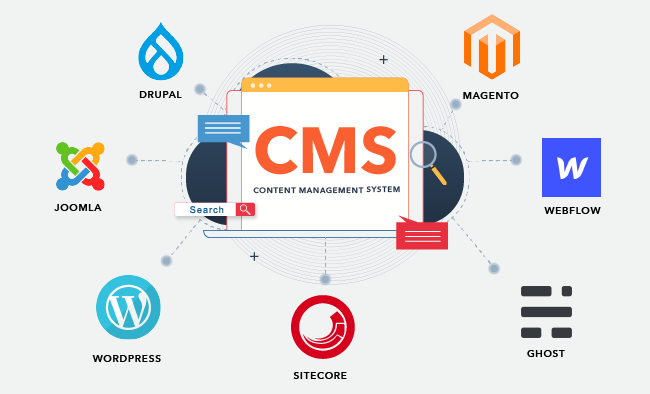CMS (Content Management System): A Comprehensive Overview
Introduction
A Content Management System (CMS) is a software application or set of related programs used to create, manage, and modify digital content. CMS platforms are essential for businesses, organizations, and individuals who need to maintain websites and digital content without requiring extensive technical knowledge. This article explores what a CMS is, its key features, popular CMS platforms, benefits, and best practices for choosing and using a CMS.
What is a CMS?
A Content Management System (CMS) is designed to facilitate the creation, management, and publication of digital content, typically on websites. It provides a user-friendly interface that allows users to add, edit, and organize content without needing to write code. CMS platforms often include features for content creation, media management, user access control, and design customization.
Key Features of a CMS
Content Creation and Editing:
WYSIWYG Editor: Most CMS platforms include a “What You See Is What You Get” (WYSIWYG) editor that allows users to create and format content using a visual interface similar to a word processor.
Content Templates: Pre-designed templates help users structure content consistently and professionally.
Media Management:
File Upload: Users can upload and manage images, videos, and other media files within the CMS.
Media Library: A centralized repository for storing and organizing media assets.
User Management:
Roles and Permissions: CMS platforms often include features for managing user roles and permissions, allowing different levels of access and control for various users.
Design and Customization:
Themes and Templates: CMS platforms provide themes and templates that can be customized to change the appearance and layout of the website.
Plugins and Extensions: Additional functionalities can be added through plugins or extensions, such as SEO tools, e-commerce features, or social media integration.
Content Organization:
Categories and Tags: Tools for organizing content into categories and tags, making it easier for users to navigate and find information.
Menus and Navigation: Features for creating and managing navigation menus to improve user experience.
SEO and Analytics:
SEO Tools: Built-in or add-on tools for optimizing content for search engines.
Analytics Integration: Integration with analytics tools to track website performance and user behavior.
Popular CMS Platforms
WordPress:
Overview: WordPress is the most widely used CMS, known for its ease of use, extensive plugin ecosystem, and customizable themes.
Use Cases: Suitable for blogs, business websites, e-commerce sites, and more.
Joomla!:
Overview: Joomla! is a flexible CMS with robust features for managing complex websites and applications.
Use Cases: Ideal for social networking sites, e-commerce platforms, and large content-driven sites.
Drupal:
Overview: Drupal is a powerful CMS known for its scalability and customization options, making it suitable for complex websites and enterprise solutions.
Use Cases: Often used for large, high-traffic websites and applications requiring advanced features and performance.
Magento:
Overview: Magento is a CMS designed specifically for e-commerce, offering extensive features for managing online stores.
Use Cases: Best suited for businesses looking to build and manage online retail platforms.
Squarespace:
Overview: Squarespace is a user-friendly CMS with a focus on design and ease of use, offering a range of templates and drag-and-drop functionality.
Use Cases: Ideal for small businesses, portfolios, and personal websites.
Benefits of Using a CMS
Ease of Use:
User-Friendly Interface: Allows users with little to no technical expertise to manage and update content easily.
Reduced Development Time: Simplifies the process of creating and maintaining websites, reducing the need for custom coding.
Flexibility and Customization:
Design and Functionality: Offers various themes, templates, and plugins to customize the look and functionality of a website.
Scalability: Supports the growth and expansion of websites by adding new features and content.
Content Management:
Organized Content: Provides tools for organizing and categorizing content, making it easier to manage and find information.
Version Control: Many CMS platforms offer version control to track changes and revert to previous versions of content if needed.
SEO and Marketing:
Search Engine Optimization: Built-in tools and plugins help optimize content for search engines.
Marketing Integration: Integration with marketing tools and analytics helps track performance and engage with audiences.
Best Practices for Choosing and Using a CMS
Assess Your Needs:
Identify Requirements: Determine the specific features and functionalities you need based on your website’s goals and audience.
Consider Scalability: Choose a CMS that can grow with your needs and handle future expansions.
Evaluate User-Friendliness:
Ease of Use: Select a CMS with an intuitive interface that aligns with the technical skills of your team.
Support and Resources: Ensure that the CMS offers adequate support, documentation, and community resources.
Check for Security:
Security Features: Look for CMS platforms with strong security features and regular updates to protect against vulnerabilities.
Backup and Recovery: Implement regular backups and have a recovery plan in place to safeguard your content.
Plan for Maintenance:
Regular Updates: Keep the CMS and its components up to date to ensure compatibility and security.
Monitor Performance: Regularly review website performance and make necessary adjustments to optimize functionality.
Conclusion
A Content Management System (CMS) is a powerful tool for managing and organizing digital content, providing a user-friendly interface for creating, updating, and maintaining websites. By understanding the key features, popular platforms, and best practices, individuals and organizations can choose and utilize a CMS effectively to achieve their digital goals. Whether for personal blogs, business websites, or complex e-commerce solutions, a well-chosen CMS can enhance content management, streamline workflows, and support successful online presence.




